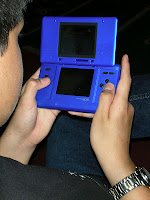Video
game time is not a right; it’s a privilege and one we want to give to our
children often. Effective parenting
means teaching your child that all good things (including fun things) are
enjoyed in moderation. Time activities
such as these and get agreements with your child up front as to how long the
game time playing will be. Set a visual timer to manage it. If the timer goes off and the child continues
to play the game, put your hand gently on his back and guide him away from the
screen and to where he needs to go.
This
is likely to work if you’ve taken the measures to set up the previous
agreement. What causes the biggest
problem for us is what we say and the energy attached to it when we don’t get
the cooperation we need and expect. A parent may say in frustration, “I TOLD
you we have to go to the grocery store now let’s go!” All that talking creates the largest part of
the problem. When you demonstrate that you are not talking and not reacting,
and you move forward calmly, you actually create a non-oppositional environment
in the room. Don’t fight with the child. Move forward peacefully and
calmly.
I know that doing this is going
to take some practice for many parents.
Another parent asked the question, “What if the child refuses to move
away from the game and you can’t physically move them?” Of course, just guiding the child isn’t going
to work in this situation so you’re going to have to come up with a different
game plan. You must first ask yourself,
“What would motivate my child to dig in their heels so deeply and resist?
What’s going on with him that he is willing to fight with me over an
issue?” The first step is to let the
child be angry. Do not try to stuff his
emotions by attempting to control how he feels.
It could be an indication that you’ve not been setting up very clear
boundaries at home and being consistent with them.
Now, let’s talk about all the things that I
consider to be entertainment electronics, not academic or educational
electronics. I’m talking about
television, video games, the Internet, or movies. These things have little or no value and
should be supervised and limited. I encourage parents to consider limiting
their child’s access to entertainment electronics to no more than one hour per
day. If you set that up in advance and
you announce, “Times up” when that hour has expired, then the child will not be
surprised because you created that limitation in advance. If the child is
getting angry, then the parent has not done their job to set things up calmly
ahead of time.
Get FREE parenting help on line at http://www.onlineparentcoaching.com.
This is an excerpt from Bill Corbett’s new
eBook, “10 Little-Known Facts About Kids That Will Change How You Parent
Forever!” Download the book today for
just $4.99 by going to http://store.payloadz.com/go?id=1044394. Bill Corbett is the author of the
award-winning parenting book series, LOVE, LIMITS, & LESSONS: A PARENT'S
GUIDE TO RAISING COOPERATIVE KIDS (in English and in Spanish) and the executive
producer and host of the public access television show CREATING COOPERATIVE
KIDS. As a member of the American Psychological Association and the North
American Society for Adlerian Psychology, Bill provides parent coaching and keynote
presentations to parent and professional audiences across the country
(http://www.OnlineParentCoaching.com). He sits on the board of the Network
Against Domestic Abuse, the Resource Advisory Committee for Attachment
Parenting International, and the management team of the Springfield Parent
Academy. Get more parenting help at
http://www.CooperativeKids.com.



Comments
Post a Comment